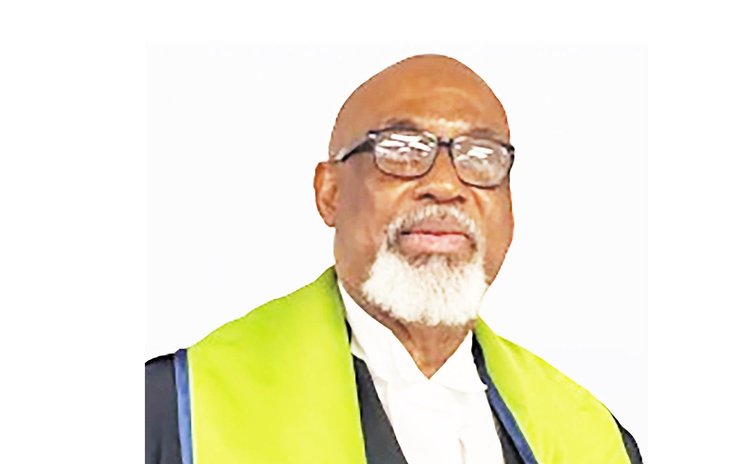Long Road to Justice
High Court Judge Colin Williams calls for a speeding up of the justice system in Dominica

High Court Judge Colin Williams, a figure of judicial authority here, has issued a scathing critique of the justice system in Dominica, which persistently keeps accused persons on remand without trial for extended periods.
While ending the January 2024 court assizes, Judge Williams asked pointedly whether the court in Dominica was wasting time. Judge Williams observed that 13 matters were listed on the January cause list, and all were completed, which might indicate a successful session.
However, the court was closing early because there were no cases to deal with. He asked whether the Dominica court was using time effectively and efficiently. How do we preserve the rule of law, he asked. The Judge observed that only one matter on the cause list had happened within the last five years.
However, Judge Williams's latest observation has been repeated many times over the past decade or more.
"This neglect of the judicial system in Dominica is unacceptable", said Mary Roberts, the then-president of the Dominica Bar Association, while commenting on the post-Hurricane Maria court system at a press conference. "It affects victims of crimes who are patiently awaiting justice, witnesses who are waiting to perform their civic duty by giving evidence in court, criminally accused persons on remand at the State Prison who are innocent until proven guilty, lawyers who are constantly faced with the daunting task of explaining to clients the reason for inordinate delays and members of the public who are entitled to protection of the law."
Roberts added: "The current backlog in the determination of the high court civil cases has been a cause of frustration for numerous court users. Many have complained about the lengthy delay between the filing of a claim and the actual trial date."
While commenting last week, Judge Williams cited a matter from back in 2014 with only two witnesses, and the case only got to the High Court in 2024. He asked: Are we delivering justice to the people of the Commonwealth of Dominica?
The Judge said the court needed only seven days of jury service from January to March 2024, and when adjournments were factored in, the days could be fewer.
Justice delayed is justice denied
In Dominica, "justice denied" refers to situations where delayed legal processes or unfair treatment prevent individuals from receiving timely and fair access to the judicial system, leading to a denial of justice. This term often highlights the negative impact of prolonged legal proceedings or discriminatory practices that hinder individuals from receiving their legal rights promptly. The concept underscores the importance of timely and equitable access to justice for all individuals within the legal system.
For instance, the absence of a Family Court in Dominica has led to prolonged legal proceedings in family-related cases, with individuals facing years of adjournments and legal manoeuvrings in matters that must be resolved promptly.
Moreover, inordinate delays have costs and consequences.
"Clearly, the bug of delay has infected every tissue of the justice system in Dominica," wrote someone named Roseau Valley in an article entitled "The cost of excessive delays in Dominica's Justice system" published in TheDominican.net website in 2012. "The unreasonable delays in our justice system adversely reflect the reputation and credibility of the system as a whole and reinforce the negative images that the public has towards the court and its judicial officers. This, unfortunately, undermines the rule of law."
Delays in Dominica's justice system have significant impacts on crime victims. These delays result in wasted time spent waiting in court, compromising the accuracy of evidence and witness testimony and causing stress for victims. The neglect of the judicial system affects victims who are awaiting justice patiently, leading to prolonged emotional and financial strain.
Additionally, delays can lead to re-traumatization for victims, affecting their mental health and well-being. Victims may face serious psychological stress due to prolonged delays in the criminal justice process, highlighting the importance of timely disposition of cases to prevent further harm to those affected by crime.
At the High Court session on Wednesday, March 13, Judge Williams also received a report from the Acting Superintendent of Prisons.
Justice Williams then thanked all those who played their part in making the session work. He noted that he has always had the best clerks, efficient and proactive wherever he has sat, but Dominica's Conley Frederick has taken the best to a new level – and High Court Clerk Frederick got a spontaneous round of applause from the court and strangers gallery wherein sat the jurors.
Jail delivery
The prison population in Dominica stood at 260 inmates, including three women, as of Wednesday, March 13, 2024, Superintendent of Prisons (Ag) Jeffrey Edmund told the Roseau High Court presided over by Justice Williams for the closing of the January 24, 2024 session.
The breakdown had 101 men and one female coming through the magistrates' courts and 31 males and two females from the High Court. There were 119 men on remand and six men awaiting trial. Fifty-six of these people had a mental illness.
Twenty-five of these inmates were foreign nationals from Venezuela, St Lucia, St Martin, Haiti, Trinidad & Tobago, USA, Nigeria and Guadeloupe. Fifteen were committed, and ten were on remand.
-With reporting from Morris Cyrille




